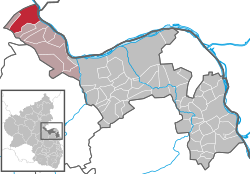Bacharach am Rhein
| Bacharach | ||
|---|---|---|

Bacharach from the Postenturm.
|
||
|
||
| Coordinates: 50°04′0″N 07°46′0″E / 50.06667°N 7.76667°ECoordinates: 50°04′0″N 07°46′0″E / 50.06667°N 7.76667°E | ||
| Country | Germany | |
| State | Rhineland-Palatinate | |
| District | Mainz-Bingen | |
| Municipal assoc. | Rhein-Nahe | |
| Government | ||
| • Mayor | Dieter Kochskämper | |
| Area | ||
| • Total | 23.65 km2 (9.13 sq mi) | |
| Elevation | 70 m (230 ft) | |
| Population (2015-12-31) | ||
| • Total | 1,880 | |
| • Density | 79/km2 (210/sq mi) | |
| Time zone | CET/CEST (UTC+1/+2) | |
| Postal codes | 55422 | |
| Dialling codes | 06743 | |
| Vehicle registration | MZ | |
| Website | www.bacharach.de | |
Bacharach (![]() pronunciation , also known as Bacharach am Rhein) is a town in the Mainz-Bingen district in Rhineland-Palatinate, Germany. It belongs to the Verbandsgemeinde of Rhein-Nahe, whose seat is in Bingen am Rhein, although that town is not within its bounds.
pronunciation , also known as Bacharach am Rhein) is a town in the Mainz-Bingen district in Rhineland-Palatinate, Germany. It belongs to the Verbandsgemeinde of Rhein-Nahe, whose seat is in Bingen am Rhein, although that town is not within its bounds.
The original name Baccaracus points to Celtic beginnings. Above the town looms Stahleck Castle (Burg Stahleck), nowadays a youth hostel.
The town lies in the Rhine Gorge, 48 km south of Koblenz.
Bacharach is divided into several Ortsteile. The outlying centre of Steeg lies in the Steeg Valley (Steeger Tal) off to the side, away from the Rhine. This glen lies between Medenscheid and Neurath to the south and Henschhausen to the north on the heights.
In the early 11th century, Bacharach had its first documentary mention. It may have been that as early as the 7th century, the kingly domain passed into Archbishop of Cologne Kunibert’s ownership; pointing to this is a Kunibertskapelle (chapel) on the spot where now stands the Wernerkapelle. The Vögte of the Cologne estate were the Elector of the Palatinate, who over time pushed back Cologne’s influence. Count Palatine already had so much influence that he resided at Stahleck Castle. His successor Konrad von Staufen’s daughter secretly wed at Stahleck Castle a son of the Welfs, who were family foes, leading to Bacharach’s, and indeed the whole County Palatine’s, falling for a short time to Henry of Brunswick. In 1214 the Wittelsbachs became Bacharach’s new lords. Together with the Unteramt of Kaub they received here their most important toll and revenue source. In 1314 it was decided to choose Louis the Bavarian as the German king. Furthermore, Bacharach was the most important transfer point for the wine trade, as barrels were offloaded here from the smaller ships that were needed to get by the Binger Loch (a quartzite reef in the Rhine upstream near Bingen) and loaded onto bigger ones. From then on, the wine bore the designation Bacharacher. The timber trade from the Hunsrück also brought Bacharach importance, and in 1356, Bacharach was granted town rights.
...
Wikipedia



